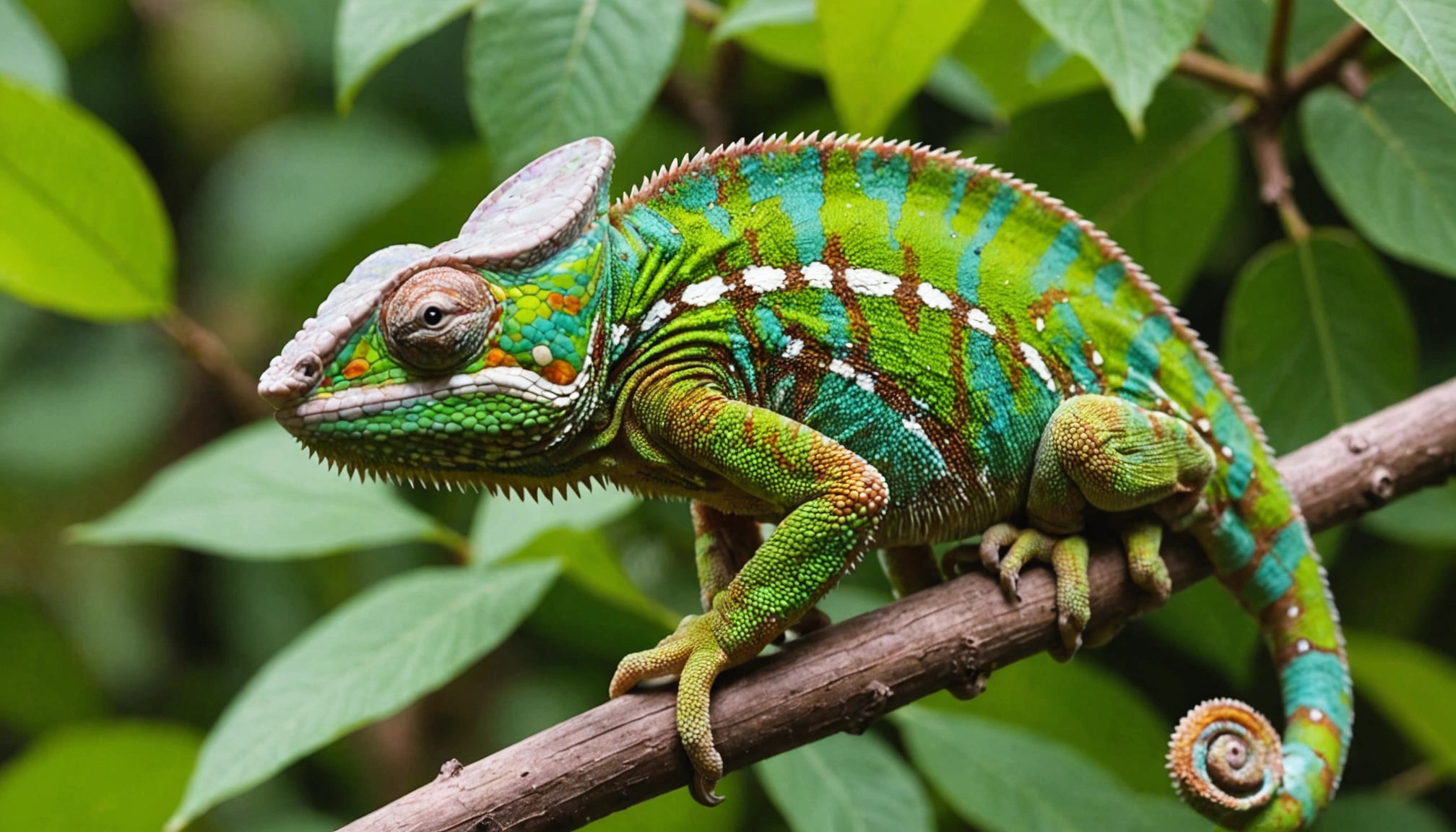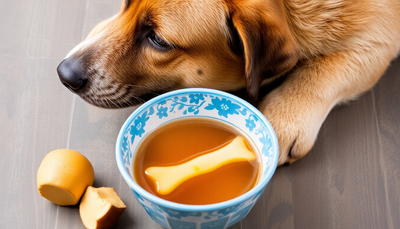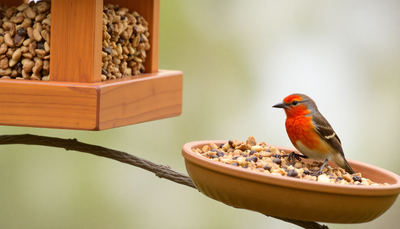Proper Nutrition for Your Chameleon

Proper nutrition plays a crucial role in the well-being of your chameleon companion. This comprehensive guide delves into the essential aspects of selecting the ideal food options tailored to meet your unique pet's dietary needs. From understanding the nutritional requirements to achieving the perfect balance of insects, fruits, and vegetables, every detail is covered. Providing the correct food not only supports your chameleon's physical health but also enhances their mental stimulation and overall happiness. Whether you're a novice or experienced owner, this guide equips you with the knowledge to make informed decisions in nourishing your beloved pet. Embark on a journey to unlock the secrets to a well-fed and thriving chameleon companion!.
Understanding Your Chameleon's Dietary Needs
Natural Diet of Chameleons in the Wild
Chameleons in the wild primarily feed on a variety of insects, such as crickets, grasshoppers, and worms. Their diet also includes occasional consumption of plant matter like leaves and fruits. Understanding what chameleons eat in their natural habitat can help replicate a similar diet in captivity.
Nutritional Requirements for Captive Chameleons
When it comes to caring for captive chameleons, it is crucial to provide a well-rounded diet that meets their nutritional needs. This includes a balance of gut-loaded insects, such as crickets and mealworms, as well as supplementation with calcium and vitamins. Failure to meet these nutritional requirements can lead to various health issues, including metabolic bone disease. Consulting with a reptile veterinarian or a knowledgeable breeder can help ensure that your chameleon's dietary needs are being met.
Importance of Hydration
In addition to a proper diet, hydration is essential for chameleons. In the wild, chameleons often drink water droplets from leaves. In captivity, misting the enclosure multiple times a day or providing a dripper system for water can help chameleons stay hydrated. Dehydration can lead to serious health problems, so ensuring access to clean water is vital.
Dietary Supplements
Apart from a varied diet, chameleons may require additional supplements to maintain their health. Calcium powder should be dusted on insects before feeding to provide the necessary calcium for bone health. Vitamin supplements, especially vitamin D3, are also crucial for chameleons, as they aid in calcium absorption. However, it's important not to over-supplement, as excessive vitamins can be harmful.
Feeding Frequency and Monitoring
Understanding how often to feed a chameleon is key to their well-being. Juvenile chameleons typically require daily feedings, while adults may be fed every other day. Monitoring their food intake and body condition is important to prevent obesity or malnutrition. Adjusting feeding schedules based on your chameleon's age, species, and activity level is essential for maintaining a healthy weight and overall health.
Conclusion
Proper nutrition is fundamental to the health and longevity of captive chameleons. By replicating their natural diet, providing essential nutrients, ensuring hydration, and monitoring their feeding habits, you can help your chameleon thrive in captivity. Regular veterinary check-ups can also help address any dietary concerns and ensure your chameleon's well-being.
Types of Chameleon Food
Chameleons are captivating reptiles known for their unique characteristics, including their specialized dietary requirements. Proper nutrition is essential for the health and longevity of chameleons. In this blog section, we will delve into the diverse types of food that are vital for meeting the dietary needs of these fascinating creatures.
Live Insects as a Staple Diet
Chameleons are primarily insectivores, relying on live insects as a staple part of their diet. In the wild, chameleons hunt a wide range of insects such as crickets, roaches, grasshoppers, and mealworms. When kept as pets, replicating this natural diet is crucial to ensure they receive essential nutrients and engage their natural hunting behavior. Offering a variety of live insects not only enriches their diet but also provides mental stimulation.
Commercially Available Chameleon Diets
The availability of commercial chameleon diets has expanded in recent years, offering a convenient alternative or supplement to live insects. These formulated diets are designed to meet the nutritional requirements of chameleons, providing a balanced blend of vitamins and minerals. While live insects should remain a significant portion of their diet, commercial diets can offer variety and additional nutrients. Choose high-quality, species-specific commercial diets to enhance your chameleon's overall nutrition.
Supplements for Chameleon Health
Apart from live insects and commercial diets, supplements play a crucial role in maintaining chameleon health. Calcium and vitamin supplements are commonly used to prevent metabolic bone diseases and ensure proper bone growth. Dusting live insects with calcium powder before feeding them to your chameleon helps meet their calcium needs. It's essential to follow recommended dosage guidelines and consult with a reptile veterinarian to tailor the supplementation to your chameleon's specific requirements.
Fruits and Vegetables for Added Nutrition
While live insects and commercial diets are essential, incorporating fruits and vegetables into your chameleon's diet can provide additional nutrients and hydration. Offer a variety of fruits such as papaya, mango, and berries, as well as leafy greens like collard greens and mustard greens. These foods can supplement their diet with essential vitamins, minerals, and antioxidants, promoting overall health and well-being.
Hydration and Water Intake
Proper hydration is crucial for chameleons, as they may not always drink from standing water sources. Providing a dripper system or misting their enclosure multiple times a day helps simulate rain, encouraging chameleons to drink water droplets from leaves. Additionally, offering a shallow dish of clean water can provide an alternative water source for your chameleon to stay hydrated.
Understanding and providing the appropriate types of food for your chameleon are fundamental to promoting their well-being and vitality. Offering a diverse array of food choices, incorporating supplements, and ensuring proper hydration will contribute to a healthy and enriched life for your chameleon companion.
Choosing the Best Food for Your Chameleon
When it comes to ensuring the health and well-being of your chameleon, selecting the right food is paramount. Chameleons require a diet that is rich in nutrients to thrive in captivity. A nutritious blend of crickets and waxworms can be an excellent choice as they provide essential fats and proteins crucial for bone health and overall vitality.
In addition to incorporating live insects into your chameleon's diet, it is also important to include a calcium supplement. Calcium plays a vital role in maintaining skin, vision, immunity, and fertility in chameleons. Ensuring that your pet receives an adequate amount of calcium will help prevent potential health issues in the long run.
To prevent common dietary mistakes, seeking guidance from a reptile expert or a vet is highly recommended. These professionals can offer valuable insights into the specific dietary requirements of chameleons and help you create a well-rounded feeding plan.
When feeding your chameleon, it is beneficial to replicate their natural feeding habits as closely as possible. Chameleons are accustomed to hunting moving prey in the wild, so offering live insects can stimulate their natural foraging behavior and keep them mentally and physically active.
Remember, providing the right food for your chameleon is essential for their survival and overall quality of life. By offering a balanced diet that meets their nutritional needs, you can ensure that your chameleon remains healthy and happy in captivity.
In addition to crickets and waxworms, other suitable insect options for chameleons include grasshoppers, locusts, and mealworms. Variety in their diet is key to ensuring they receive a broad spectrum of nutrients. Moreover, gut-loading the insects before feeding them to your chameleon can enhance their nutritional value.
It's crucial to monitor your chameleon's eating habits and adjust their diet as needed. Young chameleons may require more frequent feedings compared to adults. Always provide fresh water in a shallow dish for hydration, especially in warm weather or if your chameleon is shedding.
While live insects are a primary food source for chameleons, supplementing their diet with fruits and vegetables can offer additional vitamins and minerals. However, be cautious as some plants may be toxic to chameleons. Consulting with a knowledgeable source for a list of safe plants is advisable.
Lastly, environmental factors like temperature and humidity also influence your chameleon's dietary needs. Ensure their habitat is appropriately set up to support their overall health and digestion of food. Remember, a well-fed chameleon is a happy chameleon.
Creating a Balanced Diet Plan for Your Chameleon
When creating a balanced diet plan for a chameleon, it is crucial to understand the intricacies of their natural feeding habits. Chameleons, with their mesmerizing color-changing abilities and insect-based diet, require a diet that mirrors their wild consumption for optimal health and vitality.
Mimicking Natural Feeding Habits
In their natural habitat, chameleons predominantly feast on live insects, making it essential to replicate this diet in captivity. However, simply offering insects is not sufficient. It is equally important to provide a diverse range of insects that have been gut-loaded with nutritious greens, vegetables, and fruits. This process ensures that the chameleon receives a well-rounded nutritional profile that is essential for their overall well-being.
Importance of Calcium Supplementation
An often underestimated aspect of chameleon nutrition is calcium supplementation. Calcium plays a vital role in maintaining strong bones and supporting proper muscle function in these reptiles. Dusting the insects with a calcium powder before feeding them to your chameleon can help prevent metabolic bone disease, a common issue in captive chameleons, and maintain adequate calcium levels in their bodies.
Seeking Professional Guidance
Seeking guidance from a reptile expert or a veterinarian specializing in exotic pets is highly recommended when formulating a diet plan for your chameleon. These professionals can offer valuable insights tailored to your chameleon's specific needs based on factors like species, age, and health status. They can also advise on the ideal balance of prey items to ensure a nutritionally complete diet.
Embracing Variety in Nutrition
Variety is key when it comes to chameleon nutrition. Introducing a wide selection of prey items such as crickets, mealworms, waxworms, and roaches not only prevents nutritional deficiencies but also promotes gut health. Additionally, occasional indulgences like silkworms or hornworms can provide enrichment and mental stimulation for your chameleon.
Ensuring Overall Health and Happiness
By adhering to these guidelines and crafting a diet plan that closely mimics the chameleon's natural dietary preferences, you can significantly contribute to your pet's overall health and happiness. A well-rounded diet rich in essential nutrients, coupled with regular veterinary consultations, is pivotal in ensuring that your chameleon thrives in captivity and enjoys a long, healthy life.
Conclusion
Choosing the right food for your chameleon is crucial for its overall health and well-being. By understanding their dietary requirements and offering a variety of nutritious options such as gut-loaded insects, leafy greens, and occasional fruits, you can ensure that your chameleon receives the essential nutrients it needs to thrive. Remember to consult with a veterinarian or reptile specialist for specific dietary recommendations tailored to your chameleon's species and individual needs. With the proper diet, you can help your chameleon live a long, healthy, and happy life.






